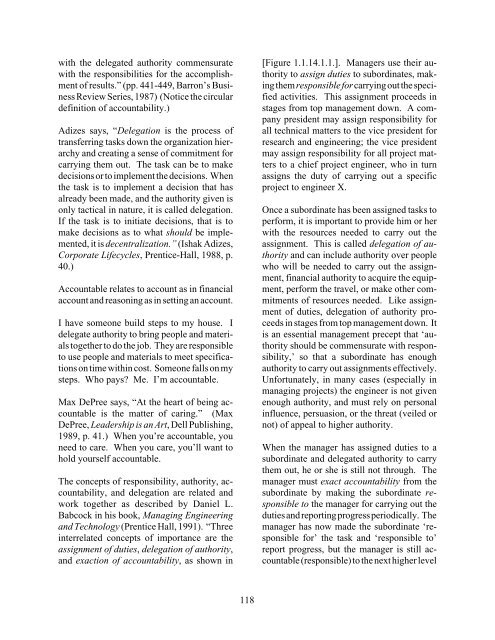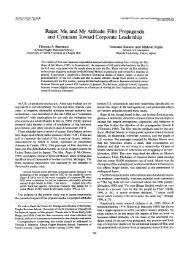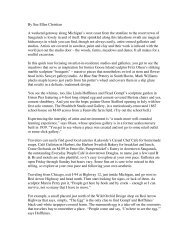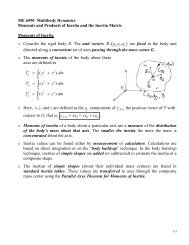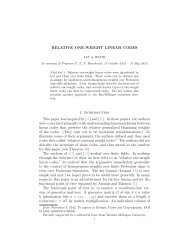- Page 1:
Management Systems Theory, Applicat
- Page 4 and 5:
1.1.11.6. Relate Engineering to the
- Page 6 and 7:
1.1.23. Other Useful Organizational
- Page 8 and 9:
1.4.2.2. Organizational Systems ...
- Page 10 and 11:
1.5.1.5. DSS vis-a-vis EDP, MIS, AO
- Page 12 and 13:
1.5.8.7.4.2.4. Time-Series Comparis
- Page 14 and 15:
1.6.2.2.5. How Much Consensus is En
- Page 16 and 17:
2.1.9.1. Choose Your Objectives-Tho
- Page 18 and 19:
3. USING MANAGEMENT TOOLS 3.0. Usin
- Page 20 and 21:
3.2.1.9. Discovering Strengths to S
- Page 22 and 23:
3.2.10. The Perspective of Quality
- Page 24 and 25:
3.4.3.1.8.1. The Scoping Agreement
- Page 26 and 27:
3.4.3.3.7. Review Progress Routinel
- Page 29 and 30:
PREFACE In this document, I use the
- Page 31 and 32:
people doing? Are we seeing a proce
- Page 33:
• Managers need rich information
- Page 36 and 37:
BACKGROUND/INTRODUCTION 1.1.1. ART
- Page 38 and 39:
BACKGROUND/INTRODUCTION 1.1.2. ART,
- Page 40 and 41:
BACKGROUND/INTRODUCTION 1.1.3. BEND
- Page 42 and 43:
esonate for us indefinitely. Mentio
- Page 44 and 45:
BACKGROUND/INTRODUCTION 1.1.4. TIME
- Page 46:
example, consider the question, “
- Page 50 and 51:
BACKGROUND/INTRODUCTION/THE OUTPUT:
- Page 52:
Knowledge 1.0 BACKGROUND Periods 1
- Page 57 and 58:
1. BACKGROUND 1.1. INTRODUCTION 1.1
- Page 59 and 60:
Liquid can be tasted and smelled. C
- Page 61 and 62:
the bay? If you answer “boats,”
- Page 64 and 65:
BACKGROUND/INTRODUCTION/SOLVING THE
- Page 66:
would start with the total system u
- Page 69 and 70:
symptom, the problem will reoccur.
- Page 72 and 73:
BACKGROUND/INTRODUCTION 1.1.8. THE
- Page 75 and 76:
1. BACKGROUND 1.1. INTRODUCTION 1.1
- Page 77 and 78:
for using the tools and guides as a
- Page 80 and 81:
BACKGROUND/INTRODUCTION/MANAGEMENT
- Page 82 and 83:
BACKGROUND/INTRODUCTION/MANAGEMENT
- Page 84:
Builder feedback ENGINEERING PROCES
- Page 89 and 90:
1. BACKGROUND 1.1. INTRODUCTION 1.1
- Page 91 and 92:
the tools well. In Figure 1.1.11.1.
- Page 93 and 94:
vironment for conditions calling fo
- Page 95 and 96: Decision Information 67 Action Figu
- Page 97 and 98: future data constituting the operat
- Page 99 and 100: mined and shaped by the tasks to be
- Page 101 and 102: lishing Co., 1979) Mane means with
- Page 103 and 104: the left block are aimed at the phy
- Page 105 and 106: 3. Each possible subset of componen
- Page 107: 1 3 Input Output 2 Figure 1.1.11.5.
- Page 110 and 111: BACKGROUND/INTRODUCTION/THE NEW (OL
- Page 112 and 113: cally different among a nuclear rea
- Page 114 and 115: BACKGROUND/INTRODUCTION/THE NEW (OL
- Page 116 and 117: BACKGROUND/INTRODUCTION/THE NEW (OL
- Page 118 and 119: is because they understand the laws
- Page 120 and 121: BACKGROUND/INTRODUCTION/THE NEW (OL
- Page 122 and 123: the system, holistic, and generalis
- Page 124 and 125: mentals of the engineering process,
- Page 126: to the total application system, we
- Page 129 and 130: that they understood best in school
- Page 131 and 132: YOU NEVER FINISH THE ENGINEERING PR
- Page 133 and 134: steps of the engineering process pa
- Page 135 and 136: 107
- Page 137 and 138: 109
- Page 139 and 140: eral sequences of activities design
- Page 141 and 142: 113
- Page 143 and 144: 1. BACKGROUND 1.1. INTRODUCTION 1.1
- Page 145: cepts modules is the difference bet
- Page 149 and 150: Assigns duties to Problem • Decis
- Page 151 and 152: 123
- Page 153 and 154: confusing by including one or more
- Page 155 and 156: 127
- Page 157 and 158: must work toward the aim of the lar
- Page 159 and 160: dent, but interconnected, within th
- Page 161 and 162: THE INTEGRATED MANAGEMENT SYSTEM HA
- Page 163 and 164: 135
- Page 165 and 166: influence they had on each other an
- Page 167 and 168: The ‘leaving unfinished’ techni
- Page 169 and 170: pendence, sincerity and individuali
- Page 171 and 172: Figure 1.1.15.2. Rodin’s Illusion
- Page 173 and 174: 1. BACKGROUND 1.1. INTRODUCTION 1.1
- Page 175 and 176: Synthesis is defined as: “the com
- Page 177 and 178: includes you, the lawn mower, and t
- Page 179 and 180: 151
- Page 181 and 182: properties. Since organizations hav
- Page 183 and 184: 155
- Page 185 and 186: change market position, product pos
- Page 187 and 188: ferred to the viewer, information i
- Page 189 and 190: feedback (recycle), and outputs (pr
- Page 191 and 192: Raw material storage Recycle of unr
- Page 193 and 194: 165
- Page 195 and 196: and its aim. The generalist perspec
- Page 197 and 198:
169
- Page 199 and 200:
confusing our means and our ends. I
- Page 201 and 202:
173
- Page 203 and 204:
tor or a wrench. A tool can be appl
- Page 205 and 206:
177
- Page 207 and 208:
uting its own set of facts, and yet
- Page 209 and 210:
and is expressed in terms of good,
- Page 211 and 212:
183
- Page 213 and 214:
point is my mother’s preference.
- Page 215 and 216:
187
- Page 217 and 218:
Feed Materials Feed Materials Figur
- Page 219 and 220:
cause of these misconceptions, info
- Page 221 and 222:
193
- Page 223 and 224:
195
- Page 225 and 226:
197
- Page 227 and 228:
1. BACKGROUND 1.1. INTRODUCTION 1.1
- Page 229 and 230:
screen. You get balance among the c
- Page 231 and 232:
WE GET BALANCE BY CONSIDERING THE I
- Page 233 and 234:
the brain as the difficulty. The th
- Page 235 and 236:
Decision Subsystem Action Subsystem
- Page 237 and 238:
ture of the learning cycle and proc
- Page 239 and 240:
211
- Page 241 and 242:
tings supports this result. One of
- Page 243 and 244:
Drucker, Mintzberg, and others. We
- Page 245 and 246:
217
- Page 247 and 248:
ing and using management tools, you
- Page 249 and 250:
promise of bringing balance to the
- Page 251 and 252:
Now we can see why the MSM is such
- Page 253 and 254:
225
- Page 255 and 256:
ack and forth with Acme, you’ll i
- Page 257 and 258:
229
- Page 259 and 260:
1. BACKGROUND 1.1. INTRODUCTION 1.1
- Page 261 and 262:
hardware, software, and other more-
- Page 263 and 264:
FOLLOW THROUGH 27 12 Evaluation Per
- Page 265 and 266:
13. Development and installation pl
- Page 267 and 268:
239
- Page 269 and 270:
241
- Page 271 and 272:
life cycle is to define the activit
- Page 273 and 274:
udget, on schedule, and up to quali
- Page 275 and 276:
247
- Page 277 and 278:
zations. .... Aging means there is
- Page 279 and 280:
251
- Page 281 and 282:
253
- Page 283 and 284:
1. BACKGROUND 1.1. INTRODUCTION 1.1
- Page 285 and 286:
257
- Page 287 and 288:
Harold the who manages and the deci
- Page 289 and 290:
261
- Page 291 and 292:
set of functions for analysis by sh
- Page 293 and 294:
265
- Page 295 and 296:
managed well enough to work through
- Page 297 and 298:
synthesis functions must work toget
- Page 299 and 300:
271
- Page 301 and 302:
or using management tools, part of
- Page 303 and 304:
clockwise direction. Here’s anoth
- Page 305 and 306:
(the ‘What is managed’ componen
- Page 307 and 308:
279
- Page 309 and 310:
tance to change. (To continue the m
- Page 311 and 312:
283
- Page 313 and 314:
human characteristics like abilitie
- Page 315 and 316:
287
- Page 317 and 318:
289
- Page 319 and 320:
291
- Page 321 and 322:
1. BACKGROUND 1.1. INTRODUCTION 1.1
- Page 323 and 324:
cess functions draw on skills to bu
- Page 325 and 326:
oth growing and aging. Before Digit
- Page 327 and 328:
measure something for continuous pe
- Page 329 and 330:
the engineer’s perspective of the
- Page 331 and 332:
point is so fundamental that it can
- Page 333 and 334:
305
- Page 335 and 336:
307
- Page 337 and 338:
the context of their internal and e
- Page 339 and 340:
Start 2.2 Analyze Situation 2.1 Con
- Page 341 and 342:
managers, and staff specialists ach
- Page 343 and 344:
315
- Page 345 and 346:
not motivate members to high perfor
- Page 347 and 348:
The Organization Strategy - Structu
- Page 349 and 350:
defined are: Planning Systems: Inte
- Page 351 and 352:
323
- Page 353 and 354:
Sink’s seven fronts and a model f
- Page 355 and 356:
327
- Page 357 and 358:
329
- Page 359 and 360:
1. BACKGROUND 1.1. INTRODUCTION 1.1
- Page 361 and 362:
INTERVENTIONS ORGANIZATIONS Figure
- Page 363 and 364:
335
- Page 365 and 366:
shows not only that the critics cri
- Page 367 and 368:
nal, V. 28, No. 2, pp. 69-79.) The
- Page 369 and 370:
341
- Page 371 and 372:
quality attributes. A quality attri
- Page 373 and 374:
345
- Page 375 and 376:
jectives to determine the specific
- Page 377 and 378:
349
- Page 379 and 380:
operational expense. “Throughput
- Page 381 and 382:
353
- Page 383 and 384:
355
- Page 385 and 386:
357
- Page 387 and 388:
359
- Page 389 and 390:
1. BACKGROUND 1.1. INTRODUCTION 1.1
- Page 391 and 392:
363
- Page 393 and 394:
The Effective Integrator Practices
- Page 395 and 396:
take a more physical example, each
- Page 397 and 398:
ner to fully utilize the skills of
- Page 399 and 400:
holistic thinking discussion. She w
- Page 401 and 402:
373
- Page 403 and 404:
stituents drive different cars, don
- Page 405 and 406:
377
- Page 407 and 408:
process of our management activitie
- Page 409 and 410:
381
- Page 411 and 412:
383
- Page 413 and 414:
A generalist builds bridges between
- Page 415 and 416:
number of fields that they seem to
- Page 417 and 418:
389
- Page 419 and 420:
sis. But James Riggs uses Pareto in
- Page 421 and 422:
393
- Page 423 and 424:
395
- Page 425 and 426:
397
- Page 427 and 428:
1. BACKGROUND 1.1. INTRODUCTION 1.1
- Page 429 and 430:
such movements (good piano techniqu
- Page 431 and 432:
403
- Page 433 and 434:
you what will happen if you do some
- Page 435 and 436:
407
- Page 437 and 438:
the other intervention. I show seve
- Page 439 and 440:
411
- Page 441 and 442:
413
- Page 443 and 444:
415
- Page 445 and 446:
417
- Page 447 and 448:
419
- Page 449 and 450:
421
- Page 451 and 452:
1. BACKGROUND 1.1. INTRODUCTION 1.1
- Page 453 and 454:
425
- Page 455 and 456:
427
- Page 457 and 458:
1. BACKGROUND 1.2. ANECDOTES 429
- Page 459 and 460:
431
- Page 461 and 462:
433
- Page 463 and 464:
1.3. ABC MODEL 435
- Page 465 and 466:
plan, control, organize, direct, an
- Page 467 and 468:
LEVEL OF ENDEAVOR STRATEGIC TACTICA
- Page 469 and 470:
with issues you didn’t expect—s
- Page 471 and 472:
ABC Audit is one way to give physic
- Page 473 and 474:
y calendars and appointment books.
- Page 475 and 476:
447
- Page 477 and 478:
or emergency environments externall
- Page 479 and 480:
to concentrate on extending and imp
- Page 481 and 482:
453
- Page 483 and 484:
ABC AUDIT FORM For each day you tra
- Page 485 and 486:
457
- Page 487 and 488:
1. BACKGROUND 1.4. THEORY 459
- Page 489 and 490:
461
- Page 491 and 492:
1. BACKGROUND 1.4. THEORY 1.4.2. A
- Page 493 and 494:
465
- Page 495 and 496:
467
- Page 497 and 498:
469
- Page 499 and 500:
471
- Page 501 and 502:
your management process. You don’
- Page 503 and 504:
475
- Page 505 and 506:
1. BACKGROUND 1.4. THEORY 1.4.2. A
- Page 507 and 508:
classification scheme today is the
- Page 509 and 510:
481
- Page 511 and 512:
with the difference between the man
- Page 513 and 514:
mains through the relationships and
- Page 515 and 516:
487
- Page 517 and 518:
managed component. As I carefully d
- Page 519 and 520:
491
- Page 521 and 522:
493
- Page 523 and 524:
1. BACKGROUND 1.4. THEORY 1.4.2. A
- Page 525 and 526:
the right data by concentrating on
- Page 527 and 528:
Representing Your Conclusions in Gr
- Page 529 and 530:
PRIORITIES WILL CHANGE IN A CONSTAN
- Page 531 and 532:
Lou Middleman tells me that Ernest
- Page 533 and 534:
short, a manager who doesn’t like
- Page 535 and 536:
Figure 1.4.2.8.4. “We’ll probab
- Page 537 and 538:
evenly distributed within the overa
- Page 539 and 540:
511
- Page 541 and 542:
ment tools have to be responsive to
- Page 543 and 544:
eact, where you act as a result of
- Page 545 and 546:
517
- Page 547 and 548:
onment, including the product or se
- Page 549 and 550:
521
- Page 551 and 552:
523
- Page 553 and 554:
525
- Page 555 and 556:
527
- Page 557 and 558:
529
- Page 559 and 560:
1. BACKGROUND 1.4. THEORY 1.4.4. FO
- Page 561 and 562:
533
- Page 563 and 564:
organization as an information proc
- Page 565 and 566:
ment information systems aren’t v
- Page 567 and 568:
1. BACKGROUND 1.4. THEORY 1.4.5. FR
- Page 569 and 570:
zation and/or its components as a c
- Page 571 and 572:
543
- Page 573 and 574:
1. BACKGROUND 1.4. THEORY 1.4.5. FR
- Page 575 and 576:
Scherkenbach) because your manageme
- Page 577 and 578:
549
- Page 579 and 580:
tions.” Finally, we move the proj
- Page 581 and 582:
fications? The same manager who had
- Page 583 and 584:
555
- Page 585 and 586:
557
- Page 587 and 588:
1. BACKGROUND 1.4. THEORY 1.4.5. FR
- Page 589 and 590:
you’re figuring out what kind of
- Page 591 and 592:
preserve more of their time for str
- Page 593 and 594:
organization, we realize people eve
- Page 595 and 596:
567
- Page 597 and 598:
take advantage of. In doing strateg
- Page 599 and 600:
FUNCTIONAL STRATEGIC TACTICAL OPERA
- Page 601 and 602:
1. BACKGROUND 1.4. THEORY 1.4.5. FR
- Page 603 and 604:
een the application of a structured
- Page 605 and 606:
577
- Page 607 and 608:
“Automation has a way of shifting
- Page 609 and 610:
clairvoyants, we must first develop
- Page 611 and 612:
1. BACKGROUND 1.4. THEORY 1.4.5. FR
- Page 613 and 614:
proved performance. In bottle-makin
- Page 615 and 616:
587
- Page 617 and 618:
589
- Page 619 and 620:
decision maker, the management tool
- Page 621 and 622:
593
- Page 623 and 624:
ognize that you’re the who manage
- Page 625 and 626:
597
- Page 627 and 628:
599
- Page 629 and 630:
601
- Page 631 and 632:
1. BACKGROUND 1.5. TOOLS AND SKILLS
- Page 633 and 634:
other designers start at the inform
- Page 635 and 636:
e reinvested in the 20%. We find mo
- Page 637 and 638:
1. BACKGROUND 1.5. TOOLS AND SKILLS
- Page 639 and 640:
611
- Page 641 and 642:
613
- Page 643 and 644:
Harold Kerzner specifies the hierar
- Page 645 and 646:
617
- Page 647 and 648:
unusual occurrence. The logic chart
- Page 649 and 650:
He has to dial his phone and the ne
- Page 651 and 652:
THE RIGHT GUIDE LEADS THE RIGHT END
- Page 653 and 654:
625
- Page 655 and 656:
ehavior, beliefs, and values. A low
- Page 657 and 658:
the concepts never have been applie
- Page 659 and 660:
631
- Page 661 and 662:
this function faster and more consi
- Page 663 and 664:
Consider, for example, a system whe
- Page 665 and 666:
637
- Page 667 and 668:
I helped design and develop a miles
- Page 669 and 670:
The who manages component changes m
- Page 671 and 672:
systems not expert systems. A respo
- Page 673 and 674:
Figure 1.5.1.7.3. You can choose fr
- Page 675 and 676:
647
- Page 677 and 678:
649
- Page 679 and 680:
651
- Page 681 and 682:
653
- Page 683 and 684:
1. BACKGROUND 1.5. TOOLS AND SKILLS
- Page 685 and 686:
synthesis; and writing, reading, sp
- Page 687 and 688:
management process. I therefore inc
- Page 689 and 690:
661
- Page 691 and 692:
manages) who’ll be using the info
- Page 693 and 694:
1. BACKGROUND 1.5. TOOLS AND SKILLS
- Page 695 and 696:
Miser and Quade approach system ana
- Page 697 and 698:
will the management tool be housed?
- Page 699 and 700:
671
- Page 701 and 702:
provide his or her own information?
- Page 703 and 704:
actual miniature models of the buil
- Page 705 and 706:
STUDENT CLASS- REQUEST CLASS SCHEDU
- Page 707 and 708:
alternatives. Identify the resource
- Page 709 and 710:
681
- Page 711 and 712:
683
- Page 713 and 714:
Systems Analysts Will Help, If You
- Page 715 and 716:
687
- Page 717 and 718:
689
- Page 719 and 720:
1. BACKGROUND 1.5. TOOLS AND SKILLS
- Page 721 and 722:
693
- Page 723 and 724:
Compare these problem solving steps
- Page 725 and 726:
people are in the system because th
- Page 727 and 728:
1. BACKGROUND 1.5. TOOLS AND SKILLS
- Page 729 and 730:
course, you don’t. You don’t ha
- Page 731 and 732:
6. Why (motivation, purpose, outcom
- Page 733 and 734:
SIX “RULES THAT ONE CAN RELY ON W
- Page 735 and 736:
707
- Page 737 and 738:
709
- Page 739 and 740:
711
- Page 741 and 742:
1.5. TOOLS AND SKILLS CATEGORIES 1.
- Page 743 and 744:
or herself. Then, the team leader,
- Page 745 and 746:
3. What single conclusion do you wa
- Page 747 and 748:
719
- Page 749 and 750:
LIST OF EXERCISES AND STEPS Exercis
- Page 751 and 752:
get stuck, read in Figure 1.5.8.5.4
- Page 753 and 754:
TWO JOURNALISM CONCEPTS WILL HELP D
- Page 755 and 756:
Step II (b) - Put your ideas into y
- Page 757 and 758:
729
- Page 759 and 760:
5) ________________________________
- Page 761 and 762:
733
- Page 763 and 764:
5) ________________________________
- Page 765 and 766:
737
- Page 767 and 768:
additional information, the highlig
- Page 769 and 770:
___________________________________
- Page 771 and 772:
743
- Page 773 and 774:
745
- Page 775 and 776:
1.5. TOOLS AND SKILLS CATEGORIES 1.
- Page 777 and 778:
eports 12 years formal training in
- Page 779 and 780:
751
- Page 781 and 782:
ure 1.5.8.5.10.2. He discusses the
- Page 783 and 784:
Interpretation has to do with match
- Page 785 and 786:
757
- Page 787 and 788:
The fourth action is to Relate. Dev
- Page 789 and 790:
speaker intended to send, then you
- Page 791 and 792:
Publications, Inc, 1988, pp.30-31.)
- Page 793 and 794:
about his or her own interests. The
- Page 795 and 796:
19. Listen for pitch, rate, timbre,
- Page 797 and 798:
Retain REFLECT Reflect Restate Reca
- Page 799 and 800:
Monitor: Stop, Paul. You again didn
- Page 801 and 802:
1.5. TOOLS AND SKILLS CATEGORIES 1.
- Page 803 and 804:
775
- Page 805 and 806:
1.5. TOOLS AND SKILLS CATEGORIES 1.
- Page 807 and 808:
through the document from topic to
- Page 809 and 810:
THE OVERALL STOP PROCEDURE HAS FIVE
- Page 811 and 812:
HOW TO WRITE TOPIC HEADINGS 1) Sinc
- Page 813 and 814:
785
- Page 815 and 816:
sure to modify what you’ve writte
- Page 817 and 818:
evaluated against those criteria. Y
- Page 819 and 820:
791
- Page 821 and 822:
1.5. TOOLS AND SKILLS CATEGORIES 1.
- Page 823 and 824:
795
- Page 825 and 826:
mats. The written formats are visua
- Page 827 and 828:
tegic-level endeavors. When managin
- Page 829 and 830:
can contain meter location and othe
- Page 831 and 832:
1.5. TOOLS AND SKILLS CATEGORIES 1.
- Page 833 and 834:
What do I mean by data becoming inf
- Page 835 and 836:
807
- Page 837 and 838:
1.5. TOOLS AND SKILLS CATEGORIES 1.
- Page 839 and 840:
ics arise from two basic criteria.
- Page 841 and 842:
BASIC CHART FORMS PIE BAR COLUMN ST
- Page 843 and 844:
Prepare 100% bar chart — one BAR
- Page 845 and 846:
B All items compared on the same sc
- Page 847 and 848:
No Prepare a STEP chart. Scale time
- Page 849 and 850:
Continuous Are data discrete or con
- Page 851 and 852:
Prepare a SCATTER diagram with a va
- Page 853 and 854:
Start Data are numerical, copious,
- Page 855 and 856:
wish to neglect—steps in the star
- Page 857 and 858:
possible for a person to see all on
- Page 859 and 860:
831
- Page 861 and 862:
ferent than the best details for in
- Page 863 and 864:
candidates for degree report—list
- Page 865 and 866:
837
- Page 867 and 868:
839
- Page 869 and 870:
1.5. TOOLS AND SKILLS CATEGORIES 1.
- Page 871 and 872:
843
- Page 873 and 874:
organization to find out who’s re
- Page 875 and 876:
explanation. To explain it may requ
- Page 877 and 878:
SIX DATA COLLECTION METHODS ARE COM
- Page 879 and 880:
851
- Page 881 and 882:
1. BACKGROUND 1.6. GROUP DECISION M
- Page 883 and 884:
AUDIENCE WHO WHAT blue red blue red
- Page 885 and 886:
we discussed earlier is valid here
- Page 887 and 888:
859
- Page 889 and 890:
through measurement and data. Organ
- Page 891 and 892:
Problem Solving or Learning Experie
- Page 893 and 894:
1. BACKGROUND 1.6. GROUP DECISION M
- Page 895 and 896:
867
- Page 897 and 898:
it is returned in its original cond
- Page 899 and 900:
Fletcher, 1979). Walter Kohler, pro
- Page 901 and 902:
across lines of authority. The stra
- Page 903 and 904:
which individuals can share the dat
- Page 905 and 906:
877
- Page 907 and 908:
into their plans. Their executive s
- Page 909 and 910:
881
- Page 911 and 912:
precedence over the original, or wh
- Page 913 and 914:
885
- Page 915 and 916:
we’re sharing is data, informatio
- Page 917 and 918:
gist, V11, N2, 1984: p. 362). Econo
- Page 919 and 920:
Entities Stakeholder Stakeholder 89
- Page 921 and 922:
organization’s product or service
- Page 923 and 924:
895
- Page 925 and 926:
1.6. GROUP DECISION MAKING 1.6.2. G
- Page 927 and 928:
group, consider all stakeholders. A
- Page 929 and 930:
1. Silent generation of ideas. 2. R
- Page 931 and 932:
one a chance and to give people the
- Page 933 and 934:
905
- Page 935 and 936:
steps of the NGT. You’ll not only
- Page 937 and 938:
Make sure the group knows that some
- Page 939 and 940:
clearly form a top group—a group
- Page 941 and 942:
worth. You’ll get about ten A ide
- Page 943 and 944:
ACTION ITEMS FOR INCREASING SALES.
- Page 945 and 946:
Scoping Form for Action Items ACTIO
- Page 947 and 948:
919
- Page 949 and 950:
1.6. GROUP DECISION MAKING 1.6.2. G
- Page 951 and 952:
ISE Vision The vision for the ISE D
- Page 953 and 954:
• Public service is another oblig
- Page 955 and 956:
group) projects and in-class presen
- Page 957 and 958:
929
- Page 959 and 960:
931
- Page 961 and 962:
933
- Page 963 and 964:
935
- Page 965 and 966:
937
- Page 967 and 968:
939
- Page 969 and 970:
HIGH RELEVANCE OF CONCEPT OR SKILL
- Page 971 and 972:
943
- Page 973 and 974:
945
- Page 975 and 976:
947
- Page 977 and 978:
949
- Page 979 and 980:
way of thinking and they don’t co
- Page 981 and 982:
1. BACKGROUND 1.6. GROUP DECISION M
- Page 983 and 984:
955
- Page 985 and 986:
among organizations is often the re
- Page 987 and 988:
959
- Page 989 and 990:
some conditions, action will be def
- Page 991 and 992:
tions of authority figures set the
- Page 993 and 994:
efit to be realized from the availa
- Page 995 and 996:
method; the group that meets for an
- Page 997 and 998:
969
- Page 999 and 1000:
population. The convener of the TRG
- Page 1001 and 1002:
achieved intra-group consensus) wit
- Page 1003 and 1004:
975
- Page 1005 and 1006:
sensus. One area where consensus is
- Page 1007 and 1008:
ainwriting, idea writing, and force
- Page 1009 and 1010:
tion between each piece of informat
- Page 1011 and 1012:
983
- Page 1013 and 1014:
985
- Page 1015 and 1016:
1. BACKGROUND 1.6. GROUP DECISION M
- Page 1017 and 1018:
affecting decision quality and stre
- Page 1019 and 1020:
ences in personalities and backgrou
- Page 1021 and 1022:
with someone else, they’re also l
- Page 1023 and 1024:
995
- Page 1025 and 1026:
Social conflict should be resolved
- Page 1027 and 1028:
The products box in Figure 1.6.2.2.
- Page 1029 and 1030:
Predispositions of Group members -
- Page 1031 and 1032:
1. BACKGROUND 1.6. GROUP DECISION M
- Page 1033 and 1034:
e made by one group member or all g
- Page 1035 and 1036:
1007
- Page 1037 and 1038:
information to their constituencies
- Page 1039 and 1040:
PROCESS: PRELIMINARY AGENDA 8:00 -
- Page 1041 and 1042:
1013
- Page 1043 and 1044:
1015
- Page 1045 and 1046:
1. BACKGROUND 1.6. GROUP DECISION M
- Page 1047 and 1048:
1019
- Page 1049 and 1050:
1021
- Page 1051 and 1052:
5. If STGWG members seek individual
- Page 1053 and 1054:
tem), they get wrapped up in compet
- Page 1055 and 1056:
the purpose is met or becomes super
- Page 1057 and 1058:
STGWG-type stakeholder group, we ha
- Page 1059 and 1060:
1. BACKGROUND 1.6. GROUP DECISION M
- Page 1061 and 1062:
As illustrated in Figure 1.6.4.1.c.
- Page 1063 and 1064:
DIMENSIONS Sub-Cube Progression Pri
- Page 1065 and 1066:
When these sources of power are tap
- Page 1067 and 1068:
1039
- Page 1069 and 1070:
2.0. BUILDING MANAGEMENT TOOLS 2.1.
- Page 1071 and 1072:
1043
- Page 1073 and 1074:
amount of data, the frequency and s
- Page 1075 and 1076:
1047
- Page 1077 and 1078:
2.0. BUILDING MANAGEMENT TOOLS 2.1.
- Page 1079 and 1080:
domain we’re building the MIS for
- Page 1081 and 1082:
1053
- Page 1083 and 1084:
defined here: 1) the system goals;
- Page 1085 and 1086:
execution of the Progamming and Tes
- Page 1087 and 1088:
1059
- Page 1089 and 1090:
1061
- Page 1091 and 1092:
ments of the management system are
- Page 1093 and 1094:
2.0. BUILDING MANAGEMENT TOOLS 2.1.
- Page 1095 and 1096:
pieces together, and to do so corre
- Page 1097 and 1098:
PERSONNEL DEPT. PERSONNEL CHANGES P
- Page 1099 and 1100:
We can further partition each subdo
- Page 1101 and 1102:
2 Contract Worker Transactions Sort
- Page 1103 and 1104:
Order CUSTOMER Mail-Payment CC-Stat
- Page 1105 and 1106:
3 CUSTOMER LEVEL-2: ACCOUNTING CRED
- Page 1107 and 1108:
In this case, you can see an interm
- Page 1109 and 1110:
MAJOR CHARACTERISTICS OF MODELS Phy
- Page 1111 and 1112:
BLUE COPY OF INVOICE INFO ABOUT CAN
- Page 1113 and 1114:
Registration Form 2.1 VALIDATE REGI
- Page 1115 and 1116:
1087
- Page 1117 and 1118:
2.0. BUILDING MANAGEMENT TOOLS 2.1.
- Page 1119 and 1120:
1091
- Page 1121 and 1122:
with a process. A fifth problem occ
- Page 1123 and 1124:
DAILY PART RECEIPTS PURCHASING OFFI
- Page 1125 and 1126:
1 STUDENT STMT 2 ADD STUDENT TO CLA
- Page 1127 and 1128:
format. But the file may have recor
- Page 1129 and 1130:
EMPLOYEE-FILE = HEADER-RECORD +BODY
- Page 1131 and 1132:
. . . Otherwise Write the account-n
- Page 1133 and 1134:
one of its paths. The rest should b
- Page 1135 and 1136:
too difficult to say with any assur
- Page 1137 and 1138:
TRANS 1. EDIT & ROUTE INQUIRY PEOPL
- Page 1139 and 1140:
information. Elizabeth passes salar
- Page 1141 and 1142:
1113 Figure 2.1.6.6.c. Physical Inf
- Page 1143 and 1144:
1. Generate task codes based on pro
- Page 1145 and 1146:
1117
- Page 1147 and 1148:
2.0. BUILDING MANAGEMENT TOOLS 2.1.
- Page 1149 and 1150:
1121
- Page 1151 and 1152:
1123
- Page 1153 and 1154:
2.0. BUILDING MANAGEMENT TOOLS 2.1.
- Page 1155 and 1156:
ased on where you get the data from
- Page 1157 and 1158:
1129
- Page 1159 and 1160:
store is simpler if it doesn’t ha
- Page 1161 and 1162:
which they submit to the manager of
- Page 1163 and 1164:
little complexity. 3. Ease of Imple
- Page 1165 and 1166:
CONTRACT MANAGER FILE = {CONTRACT M
- Page 1167 and 1168:
CONTRACT LOADING (Contract-Number +
- Page 1169 and 1170:
DATA STRUCTURES IN FIRST NORMAL FOR
- Page 1171 and 1172:
DATA STRUCTURES AFTER COMBINING COM
- Page 1173 and 1174:
1145
- Page 1175 and 1176:
2.0. BUILDING MANAGEMENT TOOLS 2.1.
- Page 1177 and 1178:
1149
- Page 1179 and 1180:
user to exercise much more control
- Page 1181 and 1182:
CHOOSE YOUR MANAGEMENT ELEMENT FROM
- Page 1183 and 1184:
sity to have her marital status cha
- Page 1185 and 1186:
ENVIRONMENTAL STRUCTURE Figure 2.1.
- Page 1187 and 1188:
1159
- Page 1189 and 1190:
2.0. BUILDING MANAGEMENT TOOLS 2.1
- Page 1191 and 1192:
1163
- Page 1193 and 1194:
adaptation is the identification of
- Page 1195 and 1196:
1167
- Page 1197 and 1198:
Later, I define what I mean by GOOD
- Page 1199 and 1200:
Information-Oriented Output Perform
- Page 1201 and 1202:
mance measures. I’ve shown the va
- Page 1203 and 1204:
the right things on time; this is e
- Page 1205 and 1206:
YOUR INFORMATION PROCESSING ACTIVIT
- Page 1207 and 1208:
1179
- Page 1209 and 1210:
2.0. BUILDING MANAGEMENT TOOLS 2.1
- Page 1211 and 1212:
1183
- Page 1213 and 1214:
ing about things like talking with
- Page 1215 and 1216:
The Impact of Evaluation To experie
- Page 1217 and 1218:
Figure 2.1.10.3.b. To experience so
- Page 1219 and 1220:
1191
- Page 1221 and 1222:
we’re doing. These concepts apply
- Page 1223 and 1224:
Performance > Expectation No Tolera
- Page 1225 and 1226:
copy machines. I’m sure that if y
- Page 1227 and 1228:
Value and cost of Information Most
- Page 1229 and 1230:
3. fast response to unexpected situ
- Page 1231 and 1232:
EXAMPLE OF MOE’s ACTIVITY DOMINAN
- Page 1233 and 1234:
1205
- Page 1235 and 1236:
Impressionistic/ Descriptive Data
- Page 1237 and 1238:
2.0. BUILDING MANAGEMENT TOOLS 2.2.
- Page 1239 and 1240:
1211
- Page 1241 and 1242:
with the director on hardware and s
- Page 1243 and 1244:
strategic plan or direction. Helpfu
- Page 1245 and 1246:
SCOPING AGREEMENT Project Name: Mul
- Page 1247 and 1248:
OPERATING PRINCIPLES and OBJECTIVES
- Page 1249 and 1250:
1221
- Page 1251 and 1252:
TASK LIST Project Name:____________
- Page 1253 and 1254:
TASK LIST Project Name: MEL Design
- Page 1255 and 1256:
1227
- Page 1257 and 1258:
activity, task and subtask by numbe
- Page 1259 and 1260:
WORK BREAKDOWN STRUCTURE 1.4.9. ___
- Page 1261 and 1262:
WORK BREAKDOWN STRUCTURE Project Na
- Page 1263 and 1264:
1235
- Page 1265 and 1266:
under the original line to show the
- Page 1267 and 1268:
GANTT CHART PROJECT MANAGER: Pamela
- Page 1269 and 1270:
GANTT CHART PROJECT: MEL Design and
- Page 1271 and 1272:
Project Name: Project Manager: MILE
- Page 1273 and 1274:
MILESTONE LOG Project Name: MEL Des
- Page 1275 and 1276:
1247
- Page 1277 and 1278:
RESPONSIBILITY MATRIX PROJECT MANAG
- Page 1279 and 1280:
RESPONSIBILITY MATRIX PROJECT NAME:
- Page 1281 and 1282:
1253
- Page 1283 and 1284:
PERSONPOWER LOADING CHART PROJECT M
- Page 1285 and 1286:
PERSONPOWER LOADING CHART PROJECT:
- Page 1287 and 1288:
1259
- Page 1289 and 1290:
PERSONPOWER LOADING HISTOGRAM PROJE
- Page 1291 and 1292:
PERSONPOWER LOADING HISTOGRAM PROJE
- Page 1293 and 1294:
Project Name: Project Manager: EXPE
- Page 1295 and 1296:
Project Name: MEL Design and Implem
- Page 1297 and 1298:
1269
- Page 1299 and 1300:
CUMULATIVE BUDGET PROJECT MANAGER:
- Page 1301 and 1302:
CUMULATIVE BUDGET Project: MEL Desi
- Page 1303 and 1304:
2.0. BUILDING MANAGEMENT TOOLS 2.2.
- Page 1305 and 1306:
1277
- Page 1307 and 1308:
2.0. BUILDING MANAGEMENT TOOLS 2.2.
- Page 1309 and 1310:
1281
- Page 1311 and 1312:
the right information and tools at
- Page 1313 and 1314:
amount of information; timeliness,
- Page 1315 and 1316:
emergency responsibility—incident
- Page 1317 and 1318:
So what tools can EOOs provide to s
- Page 1319 and 1320:
For the Critical Path Method exampl
- Page 1321 and 1322:
support for programmable decisions
- Page 1323 and 1324:
energy of the EMT. The integrator r
- Page 1325 and 1326:
and severity of consequences (e.g.,
- Page 1327 and 1328:
expect to receive communications. A
- Page 1329 and 1330:
ack systems to provide early warnin
- Page 1331 and 1332:
we’ll improve our guess of the re
- Page 1333 and 1334:
information richness, and communica
- Page 1335 and 1336:
head in one direction and find out
- Page 1337 and 1338:
Uncertainty don’t know WWA and WW
- Page 1339 and 1340:
Precipitator Purpose People Partici
- Page 1341 and 1342:
management systems engineers that c
- Page 1343 and 1344:
Reference Input Results Information
- Page 1345:
CW7 CW8 REVIEWING STATUS AND PROGRE


